King David is one of the most well-known figures in Jewish history. His life was filled with much happiness and much pain. He is known by many titles: David the conqueror, David the pious man, David the sweet singer, David the shepherd and David the penitent. King David was a descendant of Judah as well as Ruth, and was promised by G‑d that his children would rule Israel forever. Until this very day, he is remembered by Jews everywhere, who still chant his Psalms in prayer, in times of joy and sorrow.
In this article:
- David’s Early Life
- David and Saul
- David and Goliath
- True Friendship
- David the Warrior
- King Saul vs. David
- Death of Saul and Jonathan
- David Crowned as King
- King David's Victories
- King David’s Wives
- King David and Bathsheba
- Birth of Solomon
- David’s Other Sons
- David Lives Forever
- David the Composer
- Solomon and the Temple
David’s Early Life
David was born in Bethlehem, in the land of Judah, in the year 2854 (907 BCE), during the era of the prophets. He was the youngest of seven sons, and only 10 generations removed from Judah, one of Jacob's 12 sons. He was also a descendant of Ruth, the famous Moabite convert.1
A red-cheeked, bright-eyed and handsome young man, he used to tend to the sheep of his father, Jesse. Now, the people had recently anointed Saul as the first king of Israel, but Saul soon sinned and fell from Divine grace.
It was then that the prophet Samuel (as directed by G‑d) anointed David as king of Israel. And so his ascension to the throne began.2
David and Saul
King Saul and David’s first encounter occurred when an evil spirit gripped King Saul. His advisors suggested he bring in a skilled musician who would play for the king to ease his mind. One of the attendants present recommended that the king bring in young David, whom he knew to be a skilled performer. Little did Saul know that the young lad who was playing before him was destined to be his successor.3
David and Goliath

At this time, King Saul was battling the Philistines, longtime enemies of Israel.
In the valley of Elah, the two armies were poised for battle, with nothing but a hill separating them. The Philistines vastly outnumbered Saul’s army.
A Philistine giant, Goliath, appeared on the hill, and his words came roaring down like thunder:
Why should you come out to engage in battle? I am the Philistine [champion], and you are Saul’s servants. Choose one of your men and let him come down against me. If he overcomes me in combat and kills me, we will become your slaves; but if I best him and kill him, you shall be our slaves and serve us.4
The sight of the fierce giant, six cubits and a span (about 10 feet5) tall, a towering figure on the hill, clad in armour, iron and brass from head to foot, filled the Jews with great terror. There was not a single man in the Israelite camp who dared accept the challenge.
Day after day, for 40 days, this mighty giant appeared on the hill to repeat his challenge, morning and evening.
Then, young David, filled with courage, approached the giant with just a staff, a slingshot and five stones.6 And with one shot, he slew the giant where he stood. He proceeded to cut off his head and presented it to King Saul. The Philistines witnessing this event fled in fear. And David was a national hero.7,8
True Friendship
“A love that is not dependent on anything will never perish . . . an example of this is the love between David and Jonathan.”9
When David overcame Goliath in battle and was brought to King Saul’s palace to be rewarded, he met Jonathan, the son of King Saul, for the first time. At that moment, their love and respect for each other was first founded: “When [David] finished speaking with Saul, Jonathan’s soul became bound up with the soul of David; Jonathan loved David as himself.”10
This bond between the two proved itself, even in the most difficult of times. Later on, King Saul began to fear that David wanted his throne and sought to kill him. Despite knowing that David posed a potential threat to his place in line to the crown, Jonathan loved David and protected him from his father’s attempts to have him killed.
David the Warrior

King Saul then selected David to be a warrior in his army. David’s success was so great, the verse relates, “When the [troops] came home [and] David returned from killing the Philistines, the women of all the towns of Israel came out . . . The women sang as they danced, and they chanted: ‘Saul has slain his thousands; David, his tens of thousands!’”11
King Saul started to grow envious of David’s glory and kept a watchful and jealous eye on David.12
King Saul vs. David
G‑d continued to grant David much success in battle. King Saul started to fear that David’s fame and power would one day help him usurp the throne. This led to a war between the two men.
It started when David was playing the harp for the king, and a cloud of fear and anger suddenly fell upon the king. King Saul took hold of a spear and threw it at David. By Divine intervention, David managed to escape.
David fled south to the mountains of Judah, his home. He needed food and weapons. He obtained these from the city of Nob. At that time Nob was a holy place, distinguished because it housed the Tabernacle and the priests. David was taken in and cared for by Ahimelech and his fellow priests. This provided David with the opportunity to stock up on food and weapons. During his stay, he was seen by Doeg the Edomite, who was a servant of King Saul.
Fearing this, David escaped to the city of Gath, and then sought refuge in one of the caves near Adullam, in the plains of Judah. It was a secure retreat, and David’s brothers and all his father's household came to him. His solitary abode was soon known, and he was joined by many who were in distress, or in debt or had any other reason to be discontented.
Doeg the Edomite related news of David’s whereabouts to the king.
King Saul embarked on a quest to hunt down and kill David. There were two times during this hunt when King Saul was at the mercy of David, and instead of taking advantage of the situation and killing the king, David spared his life, as he dared not to lay his hand upon G‑d’s anointed one. It was only after David spared his life for the second time that King Saul finally retreated and let David be.13
Death of Saul and Jonathan
King Saul was then waging a mighty war against the Philistines.
David was in Ziklag (where he had retreated in fear that King Saul would change his mind and hunt him again) when he heard that Saul (and his son Jonathan) had died in battle. David sincerely mourned the death of Saul and Jonathan and the defeat of Israel.14
David Crowned as King
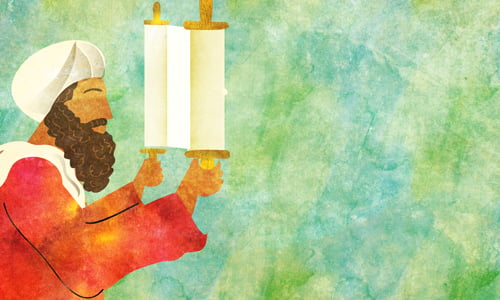
After the death of Saul, David saw that the time had come for him to emerge from exile and take over the leadership of his people. He left Ziklag and proceeded to the ancient city of Hebron, in Judah. There the people of Judah gathered and anointed him king. In the prime of his life (he was 30 years old), David was wise in council, prompt in action, G‑d-fearing and earnest, and the people recognized him as the most suitable candidate for the throne in those troubled times.
King David’s ascension to the throne did not go unprotested. Abner (previously a general in King Saul’s army) felt that the crown should remain in the family of King Saul. However, his forces were beaten swiftly, and he had no choice but to acknowledge the reality of David being king over all of Israel.
The people swarmed to Hebron to pay homage to their beloved king and to anoint him publicly. The occasion turned into a great national celebration that lasted for three days. In time, he moved his capital from Hebron to Jerusalem.15
King David's Victories
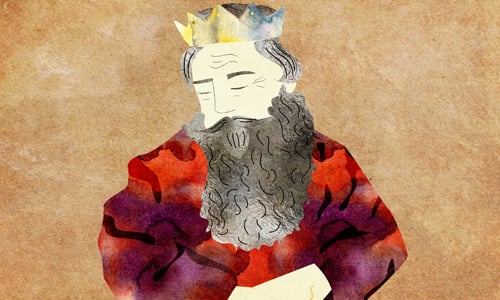
Israel was still surrounded by many hostile tribes.
King David maintained a standing army consisting of 12 divisions, each one representing one tribe of Israel. Each division numbered 24,000 men. Thus, King David's army totalled 288,000 men. David knew that before there could be real peace for his people, he would have to subdue the neighbouring enemies. He fought and subdued the Philistines, invaded Moab, slew most of their soldiers, and imposed a heavy tribute upon the people.
Then King David marched against Hadadezer, king of Zoba in Syria, whose empire extended from the vicinity of Damascus eastward to the borders of the Euphrates. He vanquished his armies, subjected his people and sent the best of his horses to Jerusalem.
This unparalleled succession of victories not only established King David's power, but also spread his name abroad. He was regarded as one of the mightiest rulers in the East.16
King David’s Wives
While King David had numerous wives,17 only eight are named in the book of Samuel: Michal, Ahinoam, Abigail, Maacah, Haggit, Avital, Eglah and Bathsheba. While not much detail is given about these women, we do know information about some of them:
Michal was the second eldest daughter of King Saul. When the king was confronted by Goliath, he promised that the warrior to defeat this giant would be wed to one of his daughters. David came and slew the giant. King Saul proposed that David marry his eldest daughter, Merav. However, at that time, Merav had already been given in marriage to another.18 King Saul then discovered that his daughter, Michal, wished to marry David. The king requested from David as a wedding dowry to marry Michal, one hundred foreskins from his enemies, the Philistines. King Saul had hoped that David would fall in battle (as he grew fearful of David as explained earlier), but David succeeded and took Michal as his wife.19
Abigail is described as a wise and beautiful women. It happened that when David and his men were fleeing from King Saul, he went to a wealthy man named Nabal to replenish his supply of food and weaponry. David expected Nabal to act generously towards him, as he had protected and did not take advantage of his shepherds who were him throughout his travels. However, Nabal, a fool and a drunk, refused and even mocked David. When his refusal was reported back to David, he made ready for war against Nabal. Abigail, the wife of Nabal, heard about this great commotion and quickly diffused the situation by running ahead and greeting David with plenty of food and gifts. Ten days later, G‑d struck Nabal and he died. Upon hearing of Nabal’s death, David sought to take Abigail as his wife and proposed to her.20
King David and Bathsheba
It happened sometime after David was proclaimed king that he was taking a stroll on the rooftops, and he beheld the beauty of a woman named Bathsheba. David inquired about the woman and was informed that she was married to a soldier named Uriah. Now David’s passion for Bathsheba was strong, and he wished to marry her. He sent Uriah to the front lines of battle, knowing full well that he was giving him a death sentence. When news of Uriah’s death reached David, he took Bathsheba as his wife.
G‑d was displeased with David’s actions and sent the prophet Nathan to rebuke the king. Knowing that he sinned, David sat in penance until G‑d forgave him.
This story raises many questions that are beyond the scope of this article, but a couple of points need to be addressed in order to bring some clarity to the story.21
According to the Talmud, the reason King David sought to marry Bathsheba and was willing to go to great lengths to do so was because he saw by Divine inspiration that he was destined to marry her and bear the next king of Israel.22 Furthermore, before sending Uriah off to battle, he had a quick discussion with him regarding the war; in the midst of which King David gave Uriah a command to go home, a command that Uriah did not obey. He told the king, “The ark and Israel and Judah are located at Sukkot, and my master Joab and Your Majesty’s men are camped in the open; how can I go home?”23
Referring to Joab (David’s general) as “my master” in front of the king was tantamount to treason, and Uriah deserved the death penalty for his rebellion.24 However, King David sentenced him to death under the guise of sending him to war so people should not say, “King David had Uriah killed so that he could take his wife.”25
Justified though his actions may be, they were still displeasing to G‑d. Nathan the prophet informed the king that the first child he would have with Bathsheba would die as a consequence of his actions.26 Shortly after this, Bathsheba gave birth to a boy who fell critically ill. David fasted and prayed in the hope of rescinding G‑d’s decree, but alas, on the seventh day, the baby passed away. David accepted this as part of his penance, got up from fasting and prostrated before G‑d.27,28
(See here for more information regarding King David’s wives.)
Birth of Solomon

David and Bathsheba then gave birth to a son they called Solomon, "the peaceful," but whom Nathan the prophet, blessing him in the name of G‑d, called Jedidiah, "the beloved of G‑d." Solomon was destined to rule over Israel.
David’s Other Sons
David had a number of sons, three of whom—Absalom, Adoniah, and Solomon—became prominent in the history of Israel.
Absalom was a handsome, ambitious and charismatic prince. He believed that he was destined to be king and feared that his elderly father would pass the crown on to young Solomon (as King David was Divinely inspired to). And so he rallied some of the greatest warriors and advisers and led a revolt against his father.
News of the revolt broke David’s heart and, instead of confronting his son in an all-out war, he fled on foot with some of his loyal servants. Absalom was determined to chase down his father, and a bloody battle ensued. Realizing that his father had the upper hand, Absalom fled in terror and dismay. As he was riding through the woods on his swift mule, his long locks of his hair got caught in the spreading branches of a large tree. Unable to extricate himself, he remained suspended, for his mule had escaped. One of David's servants brought this intelligence to Joab (King David’s general), who gave the order that Absalom be put to death.
Even though Absalom had caused great troubles for his father, King David nonetheless grieved and mourned for the death of his son.
Unfortunately, Absalom was not the only son to seek the throne. Adoniah also had grand plans to obtain the crown, but King David put an immediate halt to any other usurpers by having Solomon anointed and pronounced King of Israel.29
David Lives Forever
At the age of 70, King David passed away. It is said that before his death he asked G‑d to reveal exactly when he would leave this world.30 G‑d, not wishing to divulge this information, merely informed him on which day of the week he was die: Shabbat. David made sure to be constantly studying Torah throughout every Shabbat so that the Angel of Death (Satan) would not be able to take his soul. When David’s time on earth came to an end, the Angel of Death distracted the king from his learning by shaking the trees in his garden. The king climbed the stairs to see what the commotion was, but one of the steps broke underneath his feet. Startled, the king paused from his studies, and it was that moment that the king passed away.
David the Composer
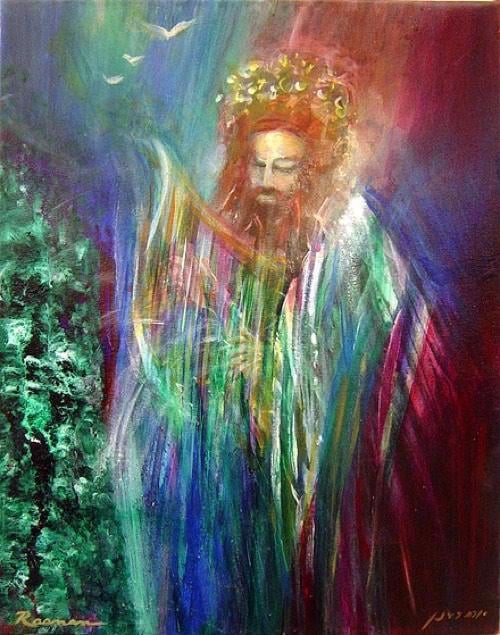
King David was not just another figure in history. He lives on to this day. One of King David’s greatest works, and arguably his greatest legacy, was the book of Psalms. During his spare time, King David would study the Torah and sing songs of praise to G‑d. The book of Psalms has been a refuge for the Jewish people in their times of trouble throughout history. Whenever Jews are in distress, they open up the book of Psalms and cry out to G‑d.
(See here for more on King David and the Psalms.)
Solomon and the Temple
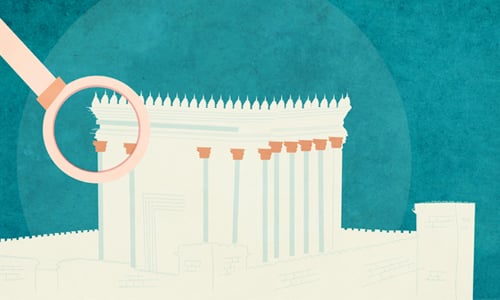
King David wished to build the Holy Temple in Jerusalem as a dwelling place for G‑d. However, Nathan the prophet told King David that it was not his destiny to build the Holy Temple (as he had spilled much blood).31 His son Solomon would build the Temple.32 Nonetheless, King David wished to participate in any way he could. And so he instructed Solomon in the building process and procured the necessary materials for the construction.33
King David was not only involved in the building of the first Holy Temple, but will be involved in the building of the third, as the Messiah will be a direct descendant of King David, and he will take us out of this exile, build the final resting place for G‑d and lead us to a world filled with peace and tranquillity.34
(See here for more information regarding the Messiah’s ancestry.)






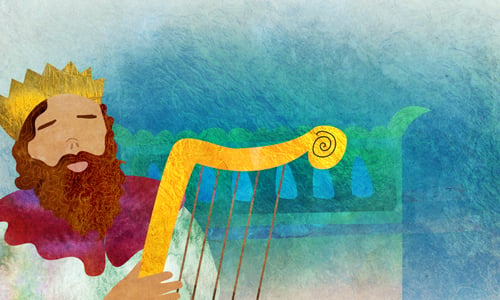




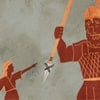
Join the Discussion